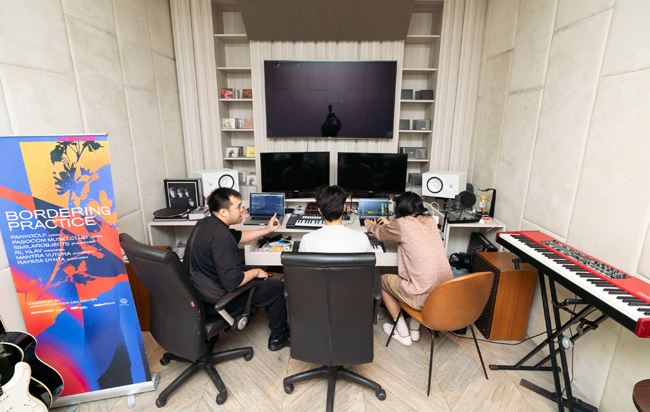Musical Collaboration as a Way of Sharing Skills and Knowledge
Patrick: I think this is a good point to talk about the residency itself in Jakarta in March 2019. What was it like for you?
tomad: It was my first experience like that. I wondered what it was going to be like. [Laughs] At the beginning, none of us had a clear idea of our individual roles, but as the days went on, we began to understand the ways we do things individually and how we create. We became more aware, and with more clarity, of what we do individually. On the last day, things got really interesting. A flute and saxophone entered the picture. We improvised with those instruments and then put them in. It was ultimately all thanks to Double Deer and the community for helping us arrive at the final product.
similarobjects: For me, it's always about the first day. [Laughs] I enjoy residencies because you never know what's going to happen. It's like opening up Pandora's box. It can be chaotic. There was chemistry in the studio, and everyone was so forward. There was no tension. We were almost immediately able to establish a game plan. We were able to come up with a workflow almost straightaway. That was my favorite memory, besides the food. Like the nasi padang.
Patrick: What were some of the challenges of the residency?
Rezky: I think, on the first day, we kind of had a game plan. But then when we were actually doing it...
similarobjects: We would deviate from it.
Rezky: Yeah. But it was all OK on the second day. The workflow became much more fluid.
similarobjects: When you meet someone new, you can't open up immediately. There were some times where you first really had to connect. You would be making music with someone and be asking them things like "Oh what kind of music are you into?" and trying to find common ground. The more you get to know one another, the more you connect with the music, too. The walls sort of crumble. So I think deviating from the plan was more about finding ways to connect with one another. I think that was the main difficulty, along with the language barrier.
tomad: I had a similar impression as you two had. At the beginning, until we had a better idea of what the individual roles were, I think it took a while. In terms of the combinations, it was very good because there were no clashes between anybody involved. Everyone was thinking about the musical layers, and doing their best in whatever their role was.
Rezky: As tomad mentioned, I just remembered that similarobjects kind of made the foundations for the tracks and then PARKGOLF chose sounds to enhance those, and Mantra Vutura would add stuff on top.
similarobjects: Then everyone just started putting on layers and layers. [Laughs] In terms of other obstacles, it's probably when you get stuck. When you come in the morning, you come in very "in the mode." But there's some parts where you get stuck. And sometimes you just have to ask someone for help. For me, when I hit that block, I call it a day. "Oh, I can't think about anything anymore." Some people are able to snap out of it when they get stuck; they just meditate outside and come back in and they're then fine. But for me, I felt like that would be the biggest obstacle. But because other people were there, we could fill one another's gaps.

Photo: Jun Yokoyama
Patrick: What did you do differently during this residency that you wouldn't have necessarily considered if you had just been working on your own?
Rezky: I think I can say for Mantra Vutura, they hadn't really experienced making the type of music that similarobjects does. So it was totally new for them.
similarobjects: What was new in the process that I experienced there was having to open up two laptops. There was a moment when both PARKGOLF and I had laptops linked via software and we were basically piecing together the track separately, but then it was linked everything and everything we were doing was synched. We could pass the files to the Double Deer engineer, and it all matched. For me, that was beautiful to see, because we are both laptop artists and heavily rely on what's on our devices. My usual way of collaborating with someone is to say "Let's use this laptop." But since it was in Japanese this time, I didn't know how to use the shortcuts or maybe his settings were different. The laptop is an extension of us. Being able to connect the music without the hassle of using someone else's machine was good. We were sort of exchanging recipes. Mantra Vutura would then ask me if they could borrow my synthesizer, use a sound, or use a piece of software. In the end, we all emerged from the process with something new: new skills, new knowledge. Like with the flute, the scales of that flute, I never knew it could change the whole vibe of the track.
Rezky: The funny thing about PARKGOLF's track "Leap (feat. Mantra Vutura & similarobjects)" is that we put in a really traditional scale of flute. We just kind of put it there for fun but it turned out to be super good. It gave the track this intense feeling.
The three tracks produced during the residency program. The tracks were released in August 2019, by Maltine Records (Tokyo), Buwan Buwan Collective (Manila), and Double Deer (Jakarta), respectively.
PARKGOLF
similarobjects
Mantra Vutura
- Next Page
- The Early Days of Bordering Practice







